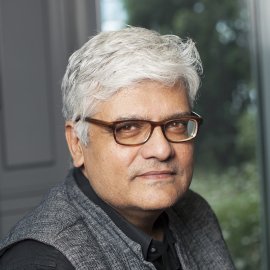History, Centre for the Study of Developing Societies, India

Avril à Juin 2016
Ravi Sankar VASUDEVAN did his Ph.D in Indian nationalist politics of the 1930s at Jawaharlal Nehru University, but his consuming interest in cinema motivated him to do a second Ph.D in film history at the University of East Anglia, Norwich. He work at the Centre for Studies in Developing Societies (CSDS), Delhi, a position which has allowed him to research, write and teach on film in relation to social history, politics, and contemporary media transformations. Though he is affiliated to what is primarily a research institute, he has taught as visiting faculty at the University of Chicago, Northwestern University, and Oberlin College in the USA, and in Delhi at the School of Arts and Aesthetics, Jawaharlal Nehru University, and the Mass Communication Research Centre, Jamia Millia Islamia as well as at the Department of Film Studies, Jadavpur University, Kolkata. From 2000 onwards he has been involved with other colleagues in running “Sarai”, the CSDS media and urban studies research programme. His current research focuses on the way in which film use was dispersed from the site of the cinema into a variety of different uses and exhibition spaces. A very challenging addition to his interests has been the founding and running along with some colleagues of a journal, Bioscope: South Asian Screen Studies.
"Information- film in colonial and post-colonial India: policies, technologies, circulation and exhibition, 1920s-1950s"
Film scholarship on India has focused largely on mainstream cinema, examining the development of a mass audience for industrialized entertainment. Other components of the cinematic package offered in a variety of exhibition spaces, namely, the newsreel, documentary, or the `topical’ which covered some spectacular current event, have not elicited much interest. Nor have non-theatrical forms, such as instructional, industrial, training, and promotional films really entered the research agenda of South Asian film studies. To this cluster of un-explored forms we can add the “home movie”, now emerging as a substantial archival resource for the exploration of colonial cinema, both in Britain and in France. I seek to explore this kaleidoscope of film forms which emerged in South Asia from the early 1920s to the immediate post-colonial era, situating them in a longer history of information and exhibition circuits. I feel that an exploration of this theme in intra-imperial perspective would contribute to the trans-national dimensions of my book project.
2012. « Official and Amateur: explorations of information film in colonial and early Independent India, 1920s-1950s' », in Film and the End of Empire, Lee Grieveson, Colin MacCabe (eds.), London: Routledge.
2011. The Melodramatic Public: Film Form and Spectatorship in Indian Cinema, New York: Palgrave Macmillan.
2010. « Geographies of the Cinematic Public: Notes on Regional, National and Global Histories of Indian Cinema », Journal of the Moving Image, No. 9, pp. 94-117.
2000. Making Meaning in Indian Cinema, Oxford: Oxford University Press.